In a recent discovery, astronomers have spotted an exoplanet or a super-Earth that is four times the size of our planet. The exoplanet named Ross 508 b revolves around a red dwarf star called Ross 508. Although the star is located just 36.5 light-years away, it is too dim to be seen with naked eyes. Astronomers have noted that the planet exists in the habitable zone of the host star. The findings are part of the study titled “A Super-Earth Orbiting Near the Inner Edge of the Habitable Zone around the M4.5-dwarf Ross 508”.
The study has been accepted to be published in the journal Publications of the Astronomical Society of Japan. The planet, Ross 508 b, orbits the star at a distance that offers temperatures conducive to the formation of water on the surface of the planet. This indicates that Ross 508 b is in the habitable zone of the star.
However, just being in the habitable zone doesn’t mean that the planet will support life. Even Mars is located within the habitable zone of the Sun but still cannot sustain life. Taking into consideration the planetary mass limits, Ross 508 is likely to be a terrestrial or rocky rather than a gaseous planet.
Researchers could spot the planet near a dim star using the Subaru Telescope of the National Astronomical Observatory of Japan (NAOJ) in Hawaii. As the star is smaller in size than our Sun, Ross 508 b orbits it every 10.75 days. Moreover, Ross 508 is significantly dim and thus Ross 508 b experiences 1.4 times the solar radiation that Earth witnesses.
The Ross 508 is 18 percent of the mass of the Sun which makes it the faintest and smallest star with an orbiting world that has been discovered using radial velocity. The radial velocity method or the wobble or Doppler method is one of the techniques used for finding exoplanets.
The techniques used for locating exoplanets are more effective in finding the giant worlds like gaseous planets that orbit at a distance that is too hot for liquid water. Locating other kinds of planets is considered trickier by astronomers.
